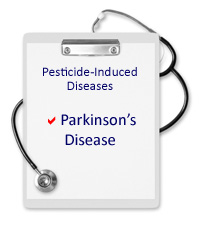Exporting Morbidity
"We would never market or continue to market any chemical which we genuinely felt posed a health risk or an environmental risk."
"I do believe paraquat is safe when it's used appropriately."
Philip A. Botham, head of product safety, Syngenta, Switzerland
"[The breadth of research is] about as persuasive as these things can get [that exposure to the herbicide Paraquat presents a danger to human health]."
"[It should be banned]."
Freya Kamel, scientist, National Institutes of Health, U.S.A.
"[The body of research linking Paraquat and Parkinson's has] converged to make a fairly convincing argument that paraquat is truly an environmental exposure that can either increase the risk of Parkinson's disease or collaborate with other factors, including genetic factors."
Dr. Vikram Khurana, neurologist, Harvard Stem Cell Institute, U.S.A.
"Our estimates of risk for ambient exposure in the workplaces were actually greater than for exposure at residences. And, of course, people who both live and work near these fields experience the greatest PD [Parkinson's disease] risk. These workplace results give us independent confirmation of our earlier work that focused only on residences, and of the damage these chemicals are doing."
"Our results suggest that pesticides affecting different cellular mechanisms that contribute to dopaminergic neuron death may act together to increase the risk of PD considerably."
Dr. Beate Ritz, senior author, professor of epidemiology, UCLA School of Public Health.


A survey of farmers and their families undertaken in 2011 in Iowa and North Carolina concluded that people handling pesticides were two and a half times likelier to develop Parkinson's with the use of Paraquat or Rotenone, (another pesticide). A year later, a subsequent study concluded that people whose genetic endowment included a variation were eleven times more likely to develop Parkinson's disease through exposure to Paraquat.
Paraquat has been around for over 130 years, but it wasn't until the mid-1900s that it was produced for common use as a pesticide. At the present time, over one hundred types of agricultural crops globally make use of the weed killer, including crops such as oranges, coffee and sugar cane. Even in Burkina Faso the use of the weed killer accounted for a fifth of the country's accidental pesticide poisoning cases, leading its government to seek out global regulation of its use.
As for Parkinson's and its onset connection with Paraquat, a more generalized view is that the loss of nerve cells in part of the brain owes to both environmental and genetic factors. Syngenta, the maker of Paraquat, insists that studies linking paraquat to Parkinson's fail to consider other incriminating factors. And the company that produces the weed killer has done so for a hundred years in Huddersfield, an industrial town in England.
But nowhere in the European Union may Paraquat be lawfully used; it is outlawed in recognition of its threat both to the environment and to human health. Britain produces it, but it cannot be used in Britain. Instead, it is exported to other countries of the world that continue to permit weed-spraying with Paraquat. Last year it was exported to Brazil, Colombia, Ecuador, Guatemala, India, Indonesia, Japan, Mexico, Panama, Singapore, South Africa, Taiwan, Uruguay and Venezuela, as well as to the United States.

This is a drug with a grim history of use in suicides. One sip of the weed killer can have lethal consequences. And now that research links its use to Parkinson's disease, the Environmental Protection Agency in the United States has stated: "There is a large body of epidemiology data on paraquat dichloride use and Parkinson's disease".
As a result, the agency is considering whether to allow the chemical to continue to be used on crops. A 2018 decision is anticipated. But until such time as that decision is made, the countries where Paraquat produce the chemical, but ban its internal use, are happy to continue exporting the product elsewhere. Switzerland, where the Syngenta company is based, has itself not allowed its use since 1989.
Monsanto's Roundup has the distinction of being the world's most used weed killer with 100 million kilograms of its active ingredient used in the United States in 2015. However, weeds are becoming resistant, and Paraquat has been marketed as an efficient and efficacious alternative. Though knowledge of the link between Paraquat and Parkinson's is decades old, the past five years of research appears to have sufficiently validated that link as to convince medical science hat the connection exists.
In the United States, Paraquat is classified as "restricted commercial use." People must obtain a license to use the product.
Breathing in Paraquat may cause lung damage and can lead to a disease called Paraquat lung. Paraquat causes damage to the body when it touches the lining of the mouth, stomach, or intestines. You can get sick if Paraquat touches a cut on your skin. Paraquat may also damage the kidneys, liver, and esophagus (the tube food goes down from your mouth to your stomach).
If Paraquat is swallowed, death can quickly occur. Death may occur from a hole in the esophagus, or from severe inflammation of the area that surrounds the major blood vessels and airways in the middle of the chest.
Long-term exposure to Paraquat may cause scarring of the lungs called pulmonary fibrosis. This makes it hard to breathe.

Labels: Agriculture, Bioscience, Disease, Neurology, Pesticides

0 Comments:
Post a Comment
<< Home